Bele Obbattu | Ugadi Obbattu | PuranPoli
Disclaimer: This is a long post and close to my heart. And I hope you find it as interesting to read as much as I loved to write it.
What is Bele Obbattu ?
Bele Obbattu or Obbattu is a stuffed sweetbread made with lentils, coconut and Jaggery. It is a delicacy made for the Hindu new year festival called Ugadi (also known as the beginning of Chaitra Navratri or the beginning of the Lunar New Year as per the Hindu Calendar)
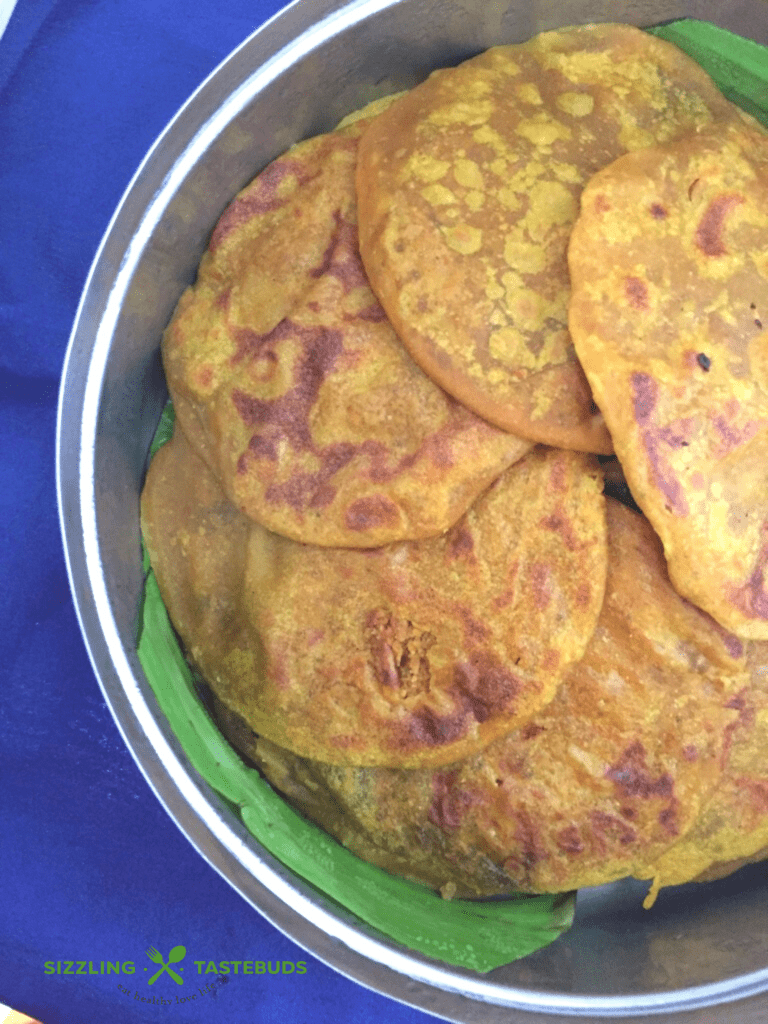
How it Obbattu different from Boli / Puranpoli?
Obbattu is a thicker version of the Poli or stuffed bread with Bele (lentils), jaggery and coconut. The difference between Obbattu – a classic Mysore Karnataka dish – and Poli, sometimes call BoLi (with which it is generally compared), couldn’t be more yawning than saying elephants and Cheetahs – both strong animals in their own right – have the same genetic pool. I have nothing against either race, but the comparision is …. ummm… not done! A similar version of this stuffed sweet bread is called “Bobbatlu” in Telugu and Puranpoli in Maharashtrian cuisine. Each household has its OWN version of making this flatbread. Instead of patting this, some households also roll the flatbread just as you would for a chapati / puri.
Memories….
Quickly coming to today’s post, it holds so many memories of being made loving by pati (my maternal grandmom) and mom too just during the festival meal that I can feel the sweetness of jaggery, the fresh coconut, the nutty aroma of jaiphal (nutmeg) wafting through the kitchen, the glistening banana leaves shimmering
in the dim light of my Pati’s kitchen – all memories that make this a yummy dish to make,and for we kids to gorge on…
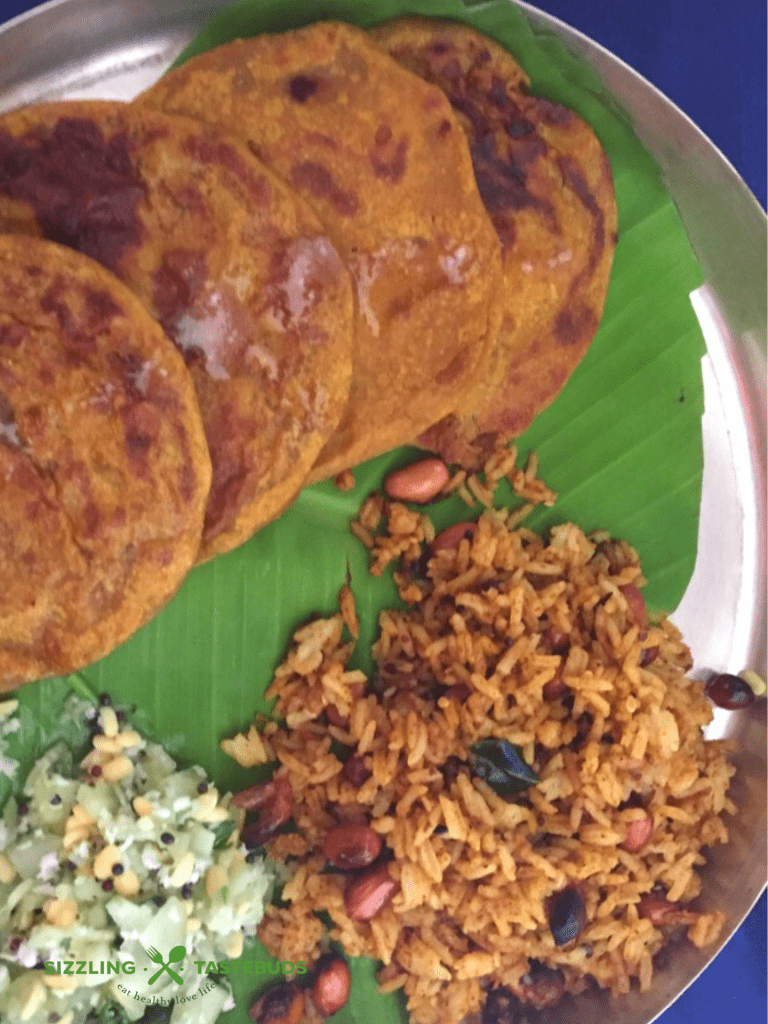
When is Obbattu served?
Festivals like Ugadi (Kannada / Telugu new year), Diwali and most celebrations at home were never complete with Obbattu , and Iyengar Puliyogare (another classic Mysore Iyengar dish).
In that sense, for those from a TamBrahm background, these were like the creme brulee of Kannada cuisine, adapted by yours truly’s family. A thinner version of Obbattu with a maida covering and coconut-sugar filling is made, and called Holige (ಹೋಳಿಗೆ) although the names are interchangeably used. The filling in Holige is much drier and powdery, although some versions use just coconut and jaggery filling which is Kaayi HoLige.
Alas. I never mastered it, and just know the steps how to make this.When Amma (mom) made this for Ugadi a few years ago, I captured most of the steps, and recorded the steps verbatim from mom (I should have used a voice recorder to make sure of the steps, perhaps next time). So, this dish comes to you lovingly served along with the Ugadi Thali (Festive spread) from my own kitchen, and the Obbattu made by mom.
Over to the recipe, now 🙂
Other Festival dishes you may like
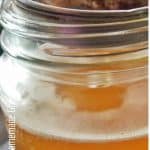


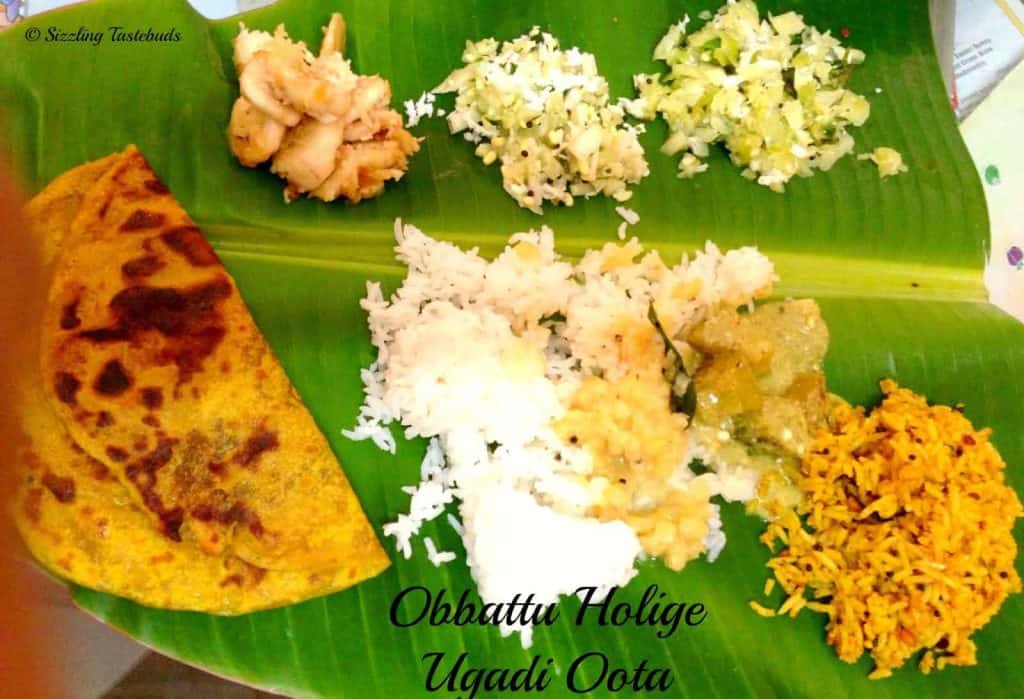
Served here as part of the Ugadi Thali:
- Obbattu
- Iyengar Puliyogare (Tamarind Rice)
- Cabbage Palya (cabbage stir fry)
- Kosambari(salad with cucumber and moong dal)
- Rasayana (banana relish with coconut and jaggery, topped with cardamom powder)
- Anna (steamed rice)
- Bele (Tempered Toor Dal)
- Malenadu Southekaayi Majjigehuli (Yellow Cucumber in spiced yoghurt gravy)
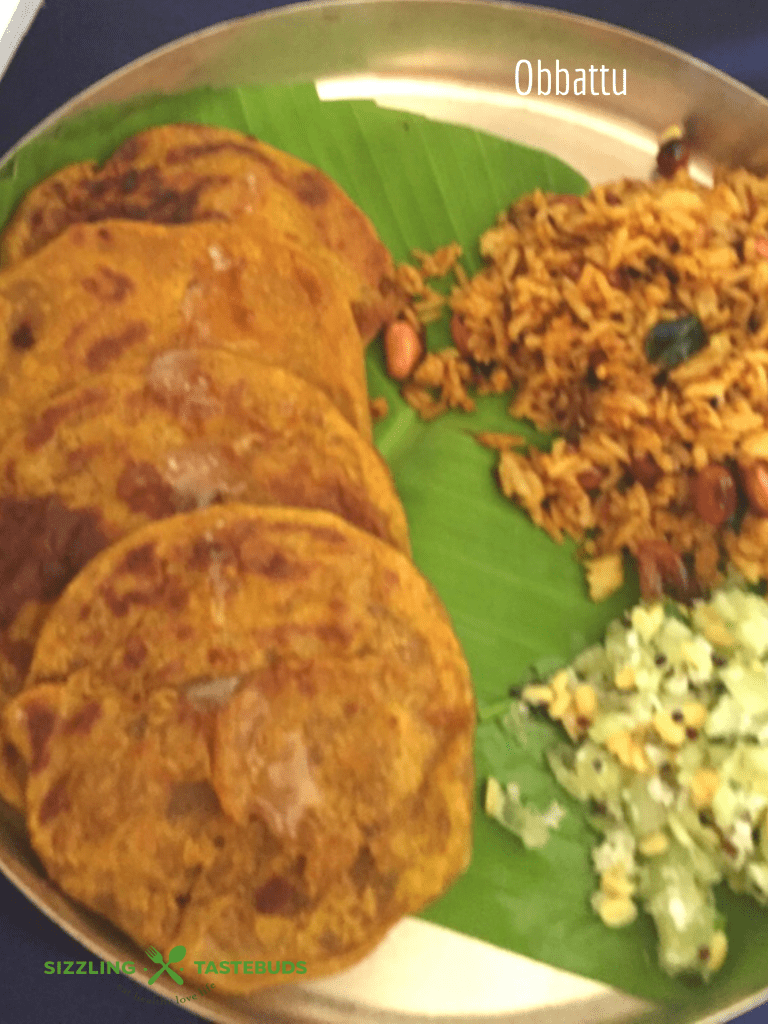
What you need to make the Bele Obbattu
Prep time : 1 hour, Resting time : 1 hour+ | Cook time : Approx 45 mins |
Makes : 15 – 20 Obbattus
Keeps for 1 week under refrigeration
Ingredients needed to make Bele Obbattu:
Stuffing :
- 1/2 cup Split Pigeon pea (Toor dal)
- 1/2 cup Bengal Gram (Channa Dal)
- 3/4 cup Jaggery (grated)
- 1/2 tsp Turmeric
- 1 cup Fresh Grated coconut – 1 cup
- 1/8 tsp Grated Nutmeg (or a large pinch)
- 1 tsp Powdered cardamom
- Oil / Ghee- to grease the rolling pin – approx 1/4 cup
- 3 banana leaves
Covering :
- 3/4 cup Wholewheat flour (Can use All Purpose flour only extensively, but amma uses both)
- 1/4 cup All Purpose flour (Maida)
- 4 TBSP FIne Semolina (Chiroti rave -If you dont have this, lightly pulse normal Sooji once)
- 1/2 tsp Salt
- 1/2 tsp Turmeric
- 5 TBSP Oil – to grease
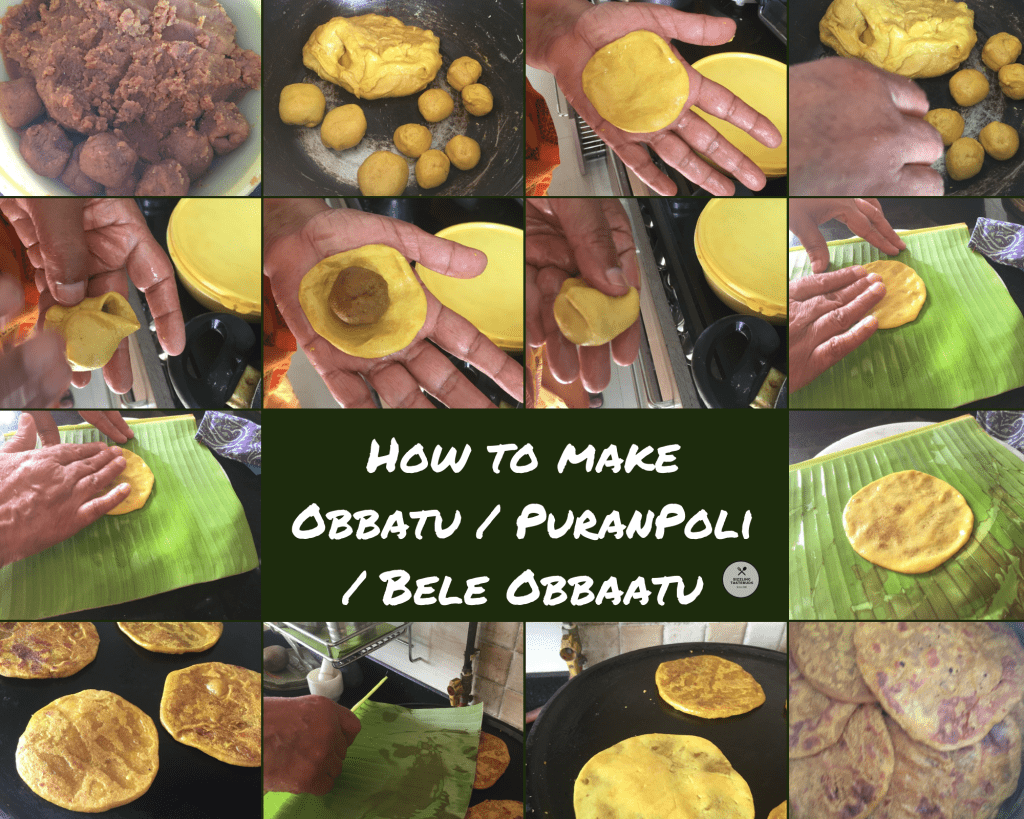
How to make the Bele Obbattu:
For the Covering or also called Kanika (ಕಣಿಕ) :
- In a large bowl, sieve the flours and salt twice over. Add the fine sooji and mix well.
- Add turmeric and little water to make a smooth dough. Add all the oil mentioned in the recipe above, and knead it well into the dough.
- Keep covered for 1- 1.5 hours.At the end of the resting / Soaking time, the dough should be stretchy without breaking, this is the test for the covering.
For the filling (a.k.a Hoorana (ಹೂರಣ)):
- Soak Dals for 1/2 hour.
- Bring 6-7 cups of water to a rolling boil, add the soaked and drained Channa Dal, turmeric and cook till the dal is cooked, and not mushy.
- If you were to press the dal between the thumb and the forefinger, it should be slightly soft, but still hold shape in the centre. This takes approx 25 mins.
Drain and retain the water (yummy Obbattu saaru – or Obbattu Rasam is made out of the extract) – recipe soon 🙂 - Cool the dals slightly & grind the dal along with the coconut to a smooth paste without adding ANY water.
- In a non stick pan, melt the grated jaggery add the coconut – dal paste.
- Cook till the masscomes to a thickish consistency, and pulls away from the pan on slow cooking (and stirring continusouly)
- Keep stirring till you are able to pat a little pancake on your palms with a small portion.
- At this stage, the filling would leave the sides and turn to a thickish slightly dry mass rolling all over the pan without sticking.
- Add powdered elaichi and grated nutmeg to it and mix well. Cool and cover with a damp kitchen towel.
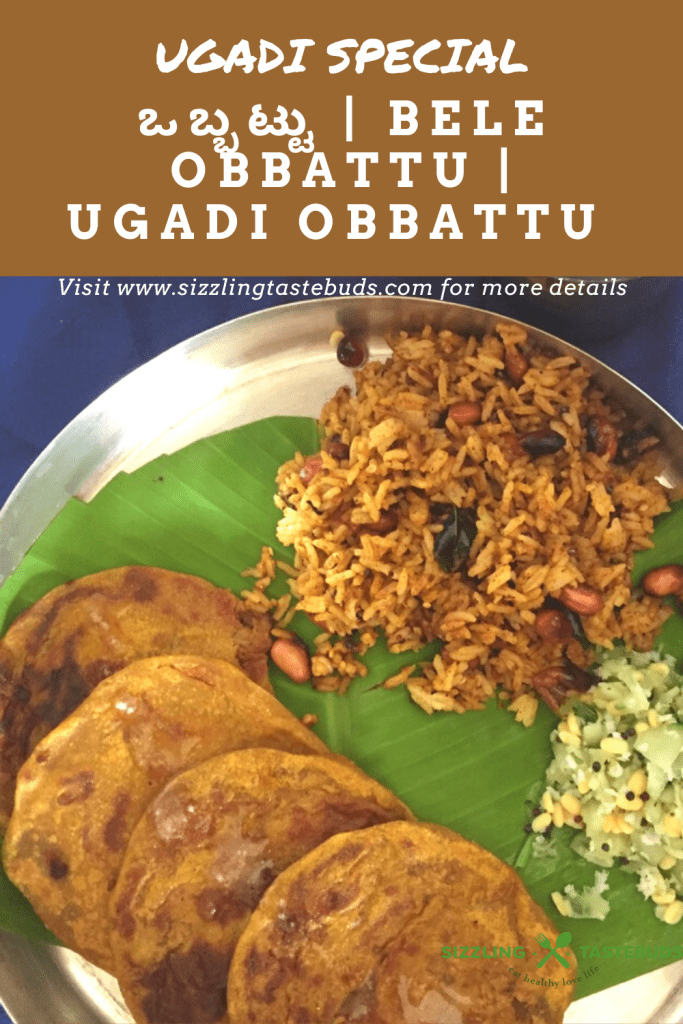
How to make the Bele Obbattu:
- Knead the outer covering well for 5 mins. Make equal portions of the stuffing.
- Grease a butter paper or banana leaf with generous oil. Pinch a small amount of the covering, and with the fingers, spread to a small disc, place the filling in the centre, and as with a modak, fold the dough over to cover the filling.
- Pinch out excess dough.
- Very gently with your fingers or lightly rolling with the rolling pin, flatten it out to a thickish disc, approx 8 inch in diamater. Take care that the filling does not come out.
- Meanwhile heat a tava on medium heat, flip the flattened out Obbattu on to the hot tava. Fry on low both sides without oil till dark brown spots appear on both sides (this is to be done on low-medium heat) else will harden.
- There is no need to add oil for frying as the flattening out / rolling out is done on a generously greased surface
- Repeat for the remaining dough.
- Serve hot with a dollop of ghee.
- Store between banana leaves in an airtight container – this keeps for upto a week under refrigeration.
- To reheat, just warm it on a tava for a min or microwave on a flat plate for 30 secs.
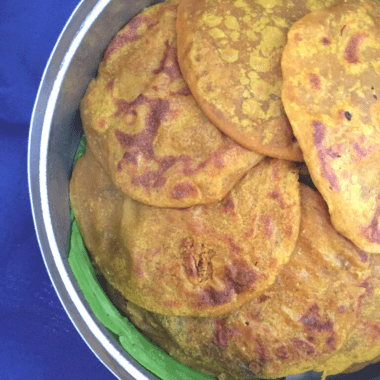
Bele Obbattu | Ugadi Obbattu | PuranPoli
Equipment
- Bowl
- Spatula
- Cast Iron Skillet
- Banana leaf sub with parchment paper
Ingredients
Stuffing
- 1/2 cup split pigeon pea Toor dal
- 1/2 cup Bengal Gram Channa Dal
- 3/4 cup Jaggery grated
- 1/2 tsp Turmeric
- 1 cup Grated coconut
- 1/8 tsp Nutmeg powder or a large pinch
- 1 tsp Cardamom powder
- Oil / Ghee- to grease the rolling pin and banana leaves – approx 1/4 cup
Outer covering
- 3/4 cup Wholewheat flour Can use All Purpose flour only extensively, but amma uses both
- 1/4 cup All Purpose flour Maida
- 4 TBSP FIne Semolina Chiroti rave -If you dont have this, lightly pulse normal Sooji once
- 1/2 tsp salt
- 1/2 tsp Turmeric
- 5 TBSP Oil to grease
Instructions
For the Covering or also called Kanika (ಕಣಿಕ) :
- In a large bowl, sieve the flours and salt twice over. Add the fine sooji and mix well.
- Add turmeric and little water to make a smooth dough. Add all the oil mentioned in the recipe above, and knead it well into the dough.
- Keep covered for 1- 1.5 hours.At the end of the resting / Soaking time, the dough should be stretchy without breaking, this is the test for the covering.
For the filling (a.k.a Hoorana (ಹೂರಣ):
- Soak Dals for 1/2 hour.
- Bring 6-7 cups of water to a rolling boil, add the soaked and drained Channa Dal, turmeric and cook till the dal is cooked, and not mushy.
- If you were to press the dal between the thumb and the forefinger, it should be slightly soft, but still hold shape in the centre. This takes approx 25 mins. Drain and retain the water (yummy Obbattu saaru – or Obbattu Rasam is made out of the extract) – recipe soon 🙂
- Cool the dals slightly & grind the dal along with the coconut to a smooth paste without adding ANY water.
- In a non stick pan, melt the grated jaggery add the coconut – dal paste.
- Cook till the masscomes to a thickish consistency, and pulls away from the pan on slow cooking (and stirring continusouly)
- Keep stirring till you are able to pat a little pancake on your palms with a small portion.
- At this stage, the filling would leave the sides and turn to a thickish slightly dry mass rolling all over the pan without sticking.
- Add powdered elaichi and grated nutmeg to it and mix well. Cool and cover with a damp kitchen towel.
How to make the Bele Obbattu:
- Knead the outer covering well for 5 mins. Make equal portions of the stuffing.
- Grease a butter paper or banana leaf with generous oil. Pinch a small amount of the covering, and with the fingers, spread to a small disc, place the filling in the centre, and as with a modak, fold the dough over to cover the filling.
- Pinch out excess dough.
- Very gently with your fingers or lightly rolling with the rolling pin, flatten it out to a thickish disc, approx 8 inch in diamater. Take care that the filling does not come out.
- Meanwhile heat a tava on medium heat, flip the flattened out Obbattu on to the hot tava. Fry on low both sides without oil till dark brown spots appear on both sides (this is to be done on low-medium heat) else will harden.
- There is no need to add oil for frying as the flattening out / rolling out is done on a generously greased surface
- Repeat for the remaining dough.
- Serve hot with a dollop of ghee.
- Store between banana leaves in an airtight container – this keeps for upto a week under refrigeration.
- To reheat, just warm it on a tava for a min or microwave on a flat plate for 30 secs.

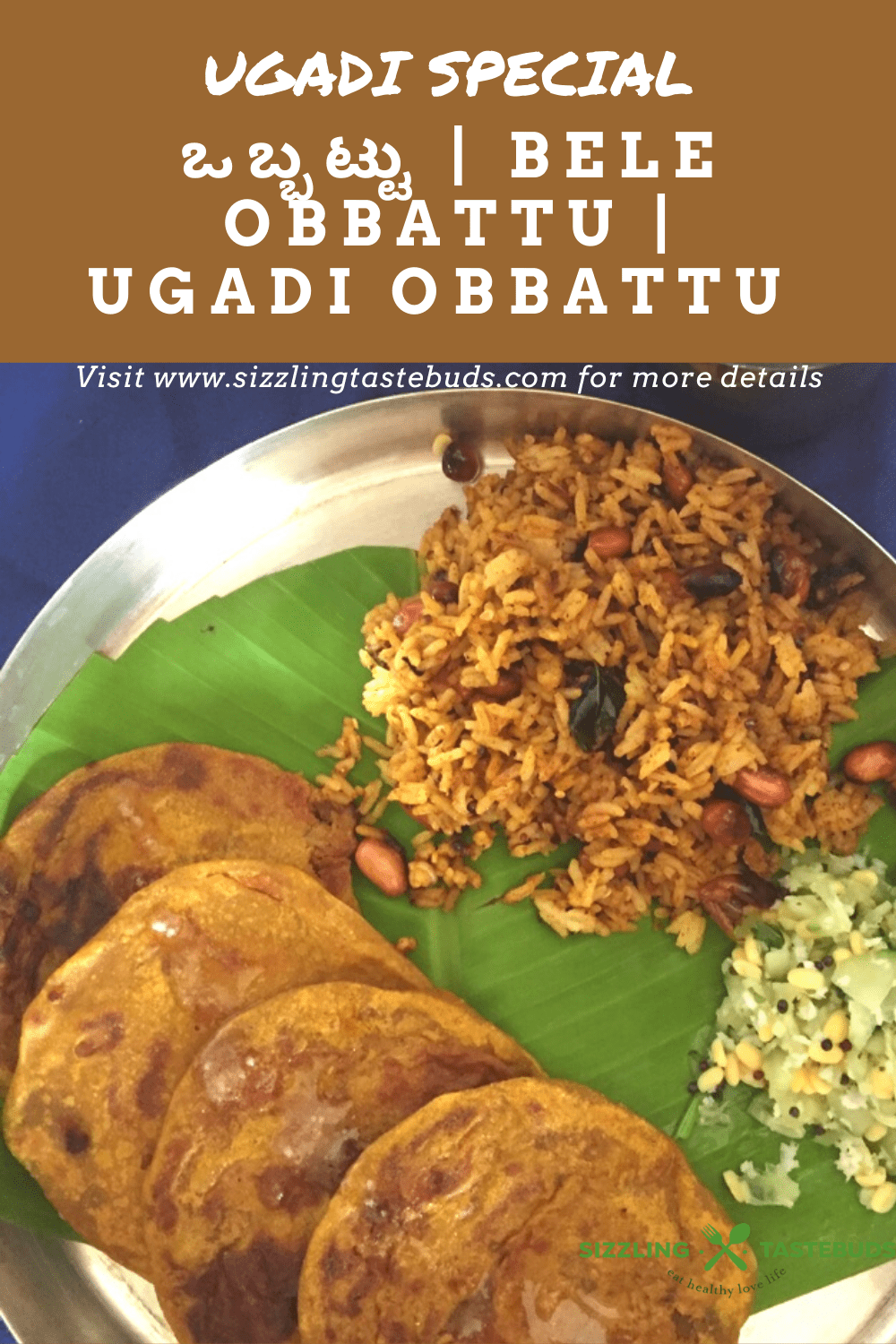

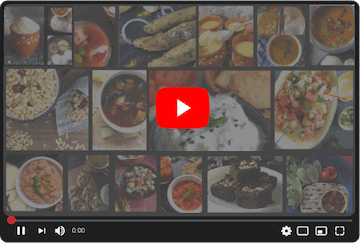
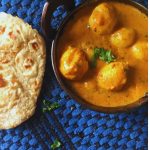
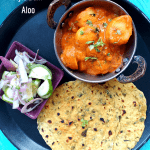

looks so beautiful!! very well written post!!
Sowmya
Obbattu sounds delicious . Is it similar to Poran Poli ?
Seriously am drooling over that Ugadi thali, wat a spread, obbattu is just torturing me..i want some rite now.
such an delicious spread 🙂 and obbattu looks super yummy and perfectly made !!
Loved reading the long post:)) it is commendable the way you are posting the recipes under one region…I am actually impressed.the polis look nice and interesting.
hahah..you really do take a dig right..this is a lovely post..your spread looks very festive..nice to see the use of different lentil and flour..very nice..
Nice to read your long post Kalyani. Enjoyed it :).And this one has been on my list for a long long time. Your spread looks awesome..
Sorry Kalyani…I dont see much of a difference between boli (the thenga/parippu boli that my MIL makes) and this. Rava is a new thing, and she uses chana dal…but not much of a difference…Am I missing something?
This what I like about our Indian cuisine. Recipes are almost similar with different names in differnt languages but each one feels theirs to be original and best.
Gujaratis too make these with toor/toovar dal. Maharashtrians make with chana dal.
These types of dishes remain close to heart. Mom is always the best cook in the world as she serves all the dishes with love. Your obbattu made by mom makes it super special and thanks for sharing it with us…
Haha…loved reading the first part of your post:-)…Obattu is delicious…time to relocate:-)
love the stuffing
Love this recipe… so tasty
Yummy looking obbattu 🙂
Yummy obbattu. Somehow never got down to making this ever. 🙂
Married to a Mysore Iyengari! This recipe is going to be really handy to make some Obbattu for the Ugadi lunch tomorrow. Great blog! 🙂
beautifully made obbattu. In my place we call them holggi and we use only chana dal. Like you said each family has a different way of making them.
yes, Holige is another word we use too! and stuffing varies from one house to another too
There must be some reason that such a flavourful, tasty lentil filled flatbread is especially made during New year by different communities in India. Gujarati new year falls immediately after Diwali and we too make puran poli. Maharashtrians make it for Gudi Padwa and Obbattu for Ugadi. Would love to know the reason.
Thanks Mayuri. I think Amma used to say festivities in those days meant a combo of comfort food (basic jaggery) plus a bit of warming foods like ghee, sugar, lentils etc, which is why it made for both advent of spring (when winter has just retreated) and at Diwali (which was again, onset of fall/ winter season)
Love this Bele Obbattu ……… Stuffed sweetbread with mix of lentils, coconut and Jaggery, one of our fav !!!
Thanks Sasmita. nice to know you guys also make this !
We make obbattu or holige as it is commonly called here but without the coconut in it. I must try this version, a slight variation in taste I guess.
yes, each household has its own variation which makes it special I guess!
Beleobattu is that one festival recipe we cannot celebrate. Your obbattu has come out so good.
THank you, Seema
Obbatu looks super yummy .thanks to you for taking step wise pics as perima makes the obattu . If time permits a detailed video will be a feather on the cap for this recipe. I always thought obbatu and holige are the same . I now feel like having some yumm obbatu
A video next time we make it. Holige is probably thinner (in my experience) and obbatu is more moist and thicker.
Bele obattu is a hot favourite at my place. Lot of memories are associated to this obattu. I can’t wait to have them when I visit my parents. Your obattu sounds flavourful and yum.
awww thanks Preethi. I do hope you make this at ur parents place and enjoy